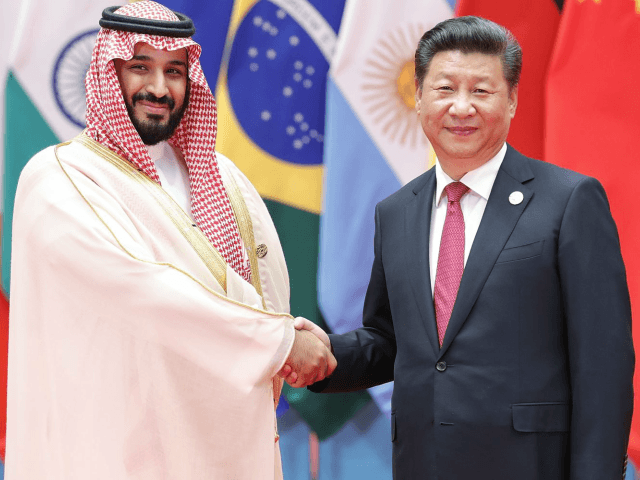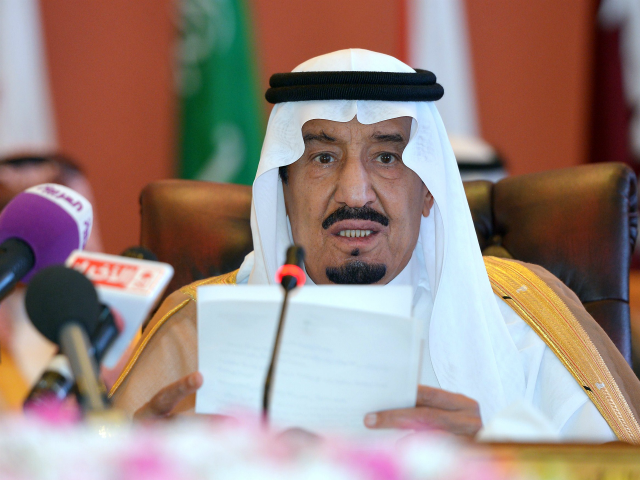Saudi Energy Minister Prince Abdulaziz bin Salman enthusiastically opposed policies to cap oil prices – apparently in reference to Western price caps on Russian oil – in an interview on Tuesday and asserted that Riyadh would not sell oil to any country that capped its oil’s price.
Prince Abdulaziz also aggressively condemned a piece of legislation in the U.S. Congress known as the “NOPEC” bill that would strip sovereign immunity from OPEC+ member nations to allow for antitrust law prosecution or lawsuits against OPEC+ member state oil companies in America.
The NOPEC bill resurfaced following OPEC+ – a Saudi-led coalition of OPEC member nations plus Russia – deciding to dramatically cut production by 2 million barrels a day last year. The production cut followed a visit by far-left President Joe Biden to Saudi Arabia to meet with de facto leader Crown Prince Mohammed bin Salman, a visit many believed was an attempt to convince Saudi Arabia to increase, not cut, its oil production.
In his interview on Tuesday, with the outlet Energy Intelligence, Prince Abdulaziz insisted that the oil production cut would remain in place through 2023.
Energy Intelligence asked the energy minister for his opinion on the NOPEC bill and a cap on the price of Russian oil imposed by the European Union in December. The EU, alongside the G7 economic coalition, agreed to limit Russian oil prices to $60 a barrel and under. The member nations to the agreement vowed to ban imports of Russian oil above that price. Oil prices are currently hovering above $70 a barrel for most common crude supplies.
In February, Russia announced it would cut its oil production by 300,000 barrels per day in response to the policy to maintain profits, spiking global crude oil prices.
The price cap is an attempt to pressure the Russian government to cease its ongoing invasion of neighboring Ukraine. The Russian government first invaded Ukraine in 2014, colonizing its Crimean peninsula, to little global response. Nearly a decade later, in February 2022, leader Vladimir Putin announced a “special operation” to oust democratically elected Ukrainian President Volodymyr Zelensky on the grounds that he was allegedly a “Nazi” and, thanks to the ouster of pro-Russian former Ukrainian President Viktor Yanukovych, Zelensky was benefitting from a “coup” and not duly elected. Zelensky, the “pro-Russian” candidate in the 2019 Ukrainian presidential election, defeated incumbent Petro Poroshenko, who succeeded Yanukovych. Poroshenko did not contest the results of the election.

File/Chinese President Xi Jinping shakes hands with Saudi Arabian Crown Prince Mohammed bin Salman bin Abdulaziz Al Saud to the G20 Summit on September 4, 2016 in Hangzhou, China. (Getty)
“NOPEC legislation and extending the price cap are very different, but their potential impacts on the oil market are similar. Such policies add new layers of risk and uncertainty at a time when clarity and stability are most needed,” Prince Abdulaziz, the energy minister, told Energy Intelligence.
The NOPEC bill, if passed, would “cause global supply to fall severely short of future demand,” the prince predicted. “The same holds for price caps, whether imposed on a country or a group of countries, on oil or any other commodity.”
“This will lead to individual or collective counter-responses with intolerable consequences in the form of massive volatility and instability,” he continued. “So if a price cap were to be imposed on Saudi oil exports, we will not sell oil to any country that imposes a price cap on our supply, and we will reduce oil production, and I would not be surprised if others do the same.”
Sens. Chuck Grassley (R-IN) and Amy Klobuchar (D-MN) returned the NOPEC bill to committee debate last week, arguing that the global oil cartel was exploiting its control over the market to keep oil product prices high.
“The oil cartel and its member countries need to know that we are committed to stopping their anti-competitive behavior,” Grassley said.
The return of the NOPEC bill followed the historic announcement by OPEC+ in October to cut production by 2 million barrels a day, sending oil product prices soaring. The move followed a visit by Biden to Riyadh in June and conversations with the crown prince. While Biden insisted that he was visiting Saudi Arabia – which he promised to turn into a “pariah” while running for president – for reasons beyond asking the country to increase oil production and potentially bringing down skyrocketing gasoline and diesel prices in America, Biden never clarified what this mystery alternative reason for the visit was.
Reports following the OPEC+ announcement claimed the Saudis decided to support the production cut in part because Biden’s trip went so poorly. The Wall Street Journal claimed Crown Prince Mohammed bin Salman openly mocked Biden for being elderly and confused. The Biden administration later admitted that Biden had attempted to convince the Saudi government to at least oppose oil production cuts until after the American midterm elections in November 2022.
The White House responded to the OPEC+ production cut by accusing Saudi Arabia of attempting to support the Russian invasion of Ukraine, an accusation the Saudis expressed great offense to.
“The Government of the Kingdom of Saudi Arabia would first like to express its total rejection of these statements that are not based on facts, and which are based on portraying the OPEC+ decision out of its purely economic context,” the Ministry of Foreign Affairs asserted at the time. “Any attempts to distort the facts about the Kingdom’s position regarding the crisis in Ukraine are unfortunate, and will not change the Kingdom’s principled position, including its vote to support UN resolutions regarding the Russian-Ukrainian crisis.”
Zelensky issued a statement thanking Saudi Arabia for its support in the war shortly after the White House’s comments.
In his interview on Tuesday, Energy Minister Prince Abdulaziz once again defended the 2-million-barrel-a-day production cut and warned the world not to expect any production increases from OPEC+ anytime soon.
“China has just started to rebound after extended [coronavirus] lockdowns, but the duration for recovery is still unclear. Economic recovery is generating inflationary pressures, and this could prompt central banks to intensify their efforts to tame inflation,” the prince said. “The interplay of these and other factors limits clarity, and the sensible and only course of action in such an uncertain environment is to maintain the agreement we struck last October for the rest of this year and that is what we intend to do. We need to ascertain that the positive indicators are sustainable.”
Follow Frances Martel on Facebook and Twitter.

COMMENTS
Please let us know if you're having issues with commenting.